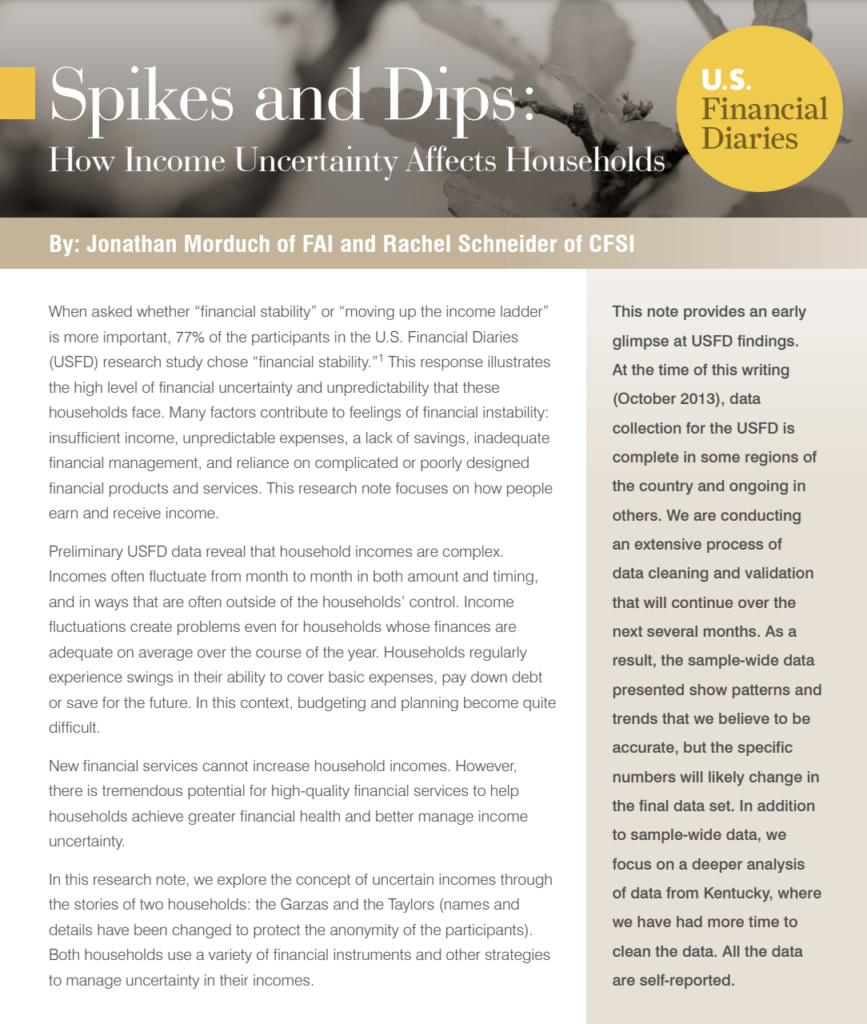All year we have heard the same storyline: employees are struggling financially and they’re looking to their employers to invest in meaningful resources to support their near-term financial health. Not only are these employees struggling with their day-to-day finances — 49% find it difficult to meet household expenses on time each month — but many are one emergency away from real, all-consuming financial hardship. While many financial hardships an individual experiences are readily apparent — natural disasters, medical issues, death in the family — there is one less obvious but looming issue hanging over employees heads: a sudden, unexpected drop in household income. Job insecurity and reduced work hours are unfortunate by-products of economic uncertainty, leaving many families to struggle making ends meet. But there’s an unlikely hero in this story: the employer.
Income volatility & the case for stronger financial safety nets for workers
Any which way you cut it, economic uncertainty has an inevitable and profound impact on employee well-being. Financial turmoil seeps into every aspect of an employees life, affecting their overall quality of life.
Financial stress extends beyond the bank account to key drivers of health and well-being. In the past year, financial stress and money worries have had a negative impact on sleep, mental health, self-esteem, physical health, and relationships at home.
Source: PwC’s 2023 Employee Financial Wellness Survey
The unknown – a partner’s job loss, a food workers missed hours due to lack of childcare, or a construction worker’s shifting schedule – creates a stress and anxiety that is hard to compartmentalize when an employee clocks in or opens their laptop in the morning.
Take, for example, the following scenario: an employee feels totally supported at work and doesn’t fear losing their job but one Friday they receive news of their partner’s job loss. Suddenly, a severe cut in once dependable household income turns those larger-than-normal grocery bills, inflated rent or mortgage payments, and hefty daycare invoices from minor inconveniences to substantial challenges.

Employees like this carry this new financial stress with them wherever they go and often experience distractions at work, leading to a decrease in their productivity and engagement at work. In fact, a recent SoFi at Work Study found that 3 in 4workers are stressed about financial issues and spend 9+ working hours per week dealing with personal finances. This, in turn, affects company performance and profitability.
Based on the average American hourly wage, you could effectively be paying financially stressed employees $3,922 or more each year to fret about money on the job.
Source: Greystone Consulting from Morgan Stanley, “The Real Costs of Employee Financial Stress—and How Employers Can Help”
Financial hardship due to household loss of income: why employees struggle
While certainly not the most obvious reason behind an employees’ financial hardship – why would an employee on payroll need help navigating a loss of income? – there are several reasons loss of income can negatively affect employees today. Those include:
- Household job loss: If someone in the household loses their job unexpectedly, it can lead to a sudden and severe reduction in income. This can occur due to layoffs, company closures, or downsizing. Without this formerly reliable source of income, employees and their families may struggle to cover essential expenses like rent or mortgage payments, utilities, and groceries.
- Irregular or variable work hours:
- Reduction in work hours: Sometimes, employers reduce an employee’s work hours or move them from full-time to part-time status. This can lead to a significant reduction in income, making it challenging to maintain their previous standard of living.
- Just-in-time scheduling: this has become a standard in industries like hospitality and retail, allowing companies to align labor availability with consumer demand. To do this, schedules are often assigned on short notice and workers could see their hours changed or canceled at the last minute.
- Seasonal work: in industries like hospitality, tourism, and construction work is often seasonal and weather-dependent. This causes workers whose households rely on this income during busy season to look for supplemental sources of income in the middle of slow season.
- Missed work due to illness: home health care workers, for example, cannot work and log expected hours to go to their paycheck when they or their patients are sick.
- Unavoidable personal issues: hourly workers face the risk of missed hours and reduced paychecks due to unforseen personal circumstances, like car issues, childcare challenges, or elder care commitments that prevent them from getting to work on time or at all.
Core to our work at Canary, is the research our founder and CEO, Rachel Schneider, did for her book, The Financial Diaries: How American Families Cope in a World of Uncertainty. In this work, she exposed the commonalities Americans experience around spikes and dips in income throughout a given year. Ultimately, this means that American households can face dramatic fluctuations in income month-to-month that make it difficult to afford basic necessities that just the month before were within reach. Now, imagine what happens to these households when those fluctuations are entirely unexpected or accompanied by an extreme emergency. Where do they go for help making ends meet until they get back on their feet?

Take a deeper look into Rachel’s research in “Spikes and Dips: How Income Uncertainty Affects Households” to meet The Garza’s and The Taylor’s, two families whose finances were significantly impacted by spikes and dips in their income.
Bridging the gap: the role of employee financial hardship grants
Access to the right financial support at the right time matters. A comprehensive approach to caring for workforce financial well-being can have a significant positive impact on employees and the workplace as a whole. Let’s take a look at how it can reduce stress, improve productivity, and enhance a work culture:
- Reduce stress: when an employee knows they have access to confidential financial assistance during emergencies they feel more financially secure. They are also less likely to experience anxiety, depression, and other stress-related conditions, which can improve their overall well-being and job performance.
- Improve productivity: when employees are preoccupied with financial stress, they may struggle to concentrate on their work tasks. Access to emergency financial support helps minimize these distractions, allowing them to perform their job more effectively and efficiently.
- Enhance positive work culture: when a company demonstrates that they care about the well-being of its employees, it increases employee trust, morale and sense of community. Providing the support employees need to navigate complex financial lives creates a work community built to attract and retain top talent.
There a lot of solutions built to address the pressing financial issues employees face today. It’s clear that employees want more than what’s been standard – paychecks, bonuses, 401ks, insurance benefits – to feel truly valued and supported at work. To that end, we have pulled together a list of five real-world examples of meaningful workplace solutions to help employees navigate financial hardship and support their overall well-being:
- Outsourced employee relief funds: HR teams that know their employees struggle financially – maybe noticing increased absenteeism, higher-than-normal early 401k withdrawal requests, or personal GoFundMe’s – can offer confidential, dignified access to grant money when times get tough.
- Employee assistance programs (EAPs): EAPs are a fairly standard workplace offering, providing access to programs aimed at helping workers address personal challenges.
- Financial health tools and counseling: giving employees access to reputable financial coaching and education tools, like Addition Wealth’s financial health platform.
- Emergency savings programs: part of the reason employees and their families struggle financially is a lack of savings to fall back on. Now, it’s true that not everyone is in a position to save regularly enough to build this cushion, but emergency savings programs, like Sunny Day Fund, are an increasingly popular way to support employee financial health.
- PTO donation programs: solutions like PTO Exchange enable employees to convert or donate unused PTO so its monetary value can be put toward other goals or causes.
These programs can have an invaluable impact on employees’ financial well-being, job satisfaction, and overall quality of life. In a world marred by so much uncertainty, it’s essential for employers to recognize the financial hardships their employees face. Once they do, the better they can tailor support to meet the diverse needs of their workforce.
The loss of household income can have a profound impact on individuals and their families, making it difficult to afford even the most basic necessities. However, by providing access to emergency financial help, employers can bridge the gap between reduced income and ongoing expenses. This not only reduces stress and improves productivity but also contributes to a positive and supportive work culture. In times of need, even relatively small cash infusions can make all the difference in the world for families facing financial distress.
It’s certainly a better business decision to offer access to emergency grants (Canary’s average grant size is just under $1,000) than to continue throwing away money due to lost productivity.
To learn more about supporting your employees through financial hardships, reach out to our team today. In the meantime, download our most recent Impact Report to learn how employee relief funds support modern, diverse workforces in uncertain times.






